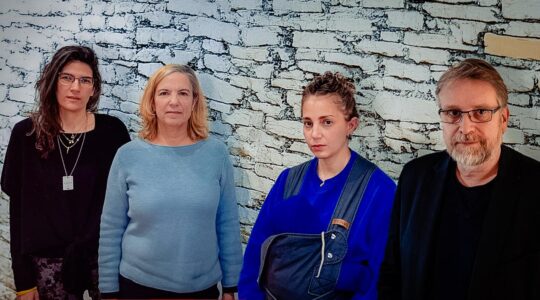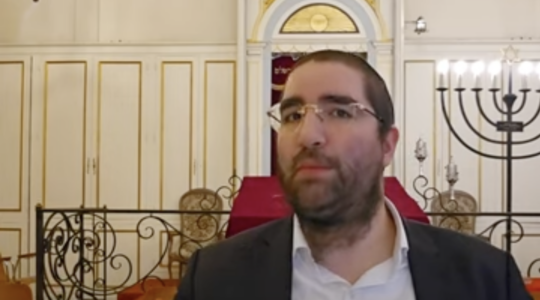
Yotam Polizer, IsraAID’s Japan project manager, plays the guitar for residents of a temporary housing site for tsunami survivors in Ishinomaki as part of a music therapy session run by post-trauma experts from the Israeli NGO. Community leader Chiho Shimura, center, is among those enjoying Polizer’s music. (Boaz Arad)

Kohata Yuriko, who saved her father and her son from the tsunami, is comforted by IsraAID project coordinator/translator Celia Dunkelman, left, and therapist Osnat Nisanov, right, at a workshop in one of Iwanuma’s many temporary housing sites. (Boaz Arad)
SENDAI, Japan (JTA) — Tears run down the face of Kohata Yuriko as she recalls the events of March 11 last year, when a massive 9.0 magnitude earthquake struck off the coast of eastern Japan in the early afternoon.
Shopping for groceries in the small fishing town of Iwanuma, she heard the tsunami sirens.
Realizing she had little time, Yuriko collected her son and 93-year-old father and fled. As her foot hit the gas pedal, she could hear the horrible noise of the wave as it came crashing through the neighborhood.
Later that day, Yuriko learned that a grandmother and her grandson, a good friend of her son’s, perished in the neighboring house as the tsunami smashed into it. Upon hearing the news, her son started to cry.
“Thank you mom,” he said again and again. “Thank you for coming back for me.”
Through an interpreter, Yuriko says she still cries all the time when she’s alone.
“I’m so stressed and nervous that I can hardly breathe,” she says.
But with the assistance of volunteers and post-trauma experts from the Israeli nongovernmental organization IsraAID, she is beginning to learn to cope with the tragedy.
Yuriko is sitting on the floor of a caravan converted into a community center in one of the temporary housing sites built to accommodate the tens of thousands of tsunami survivors who lost their homes to the wave. Helped by the aid workers she dances, bangs on drums, laughs and smiles — and then, asked to choose from a pile of special cards used as psychotherapeutic tools, she begins to cry.
It is the first time since the disaster that she has cried in front of someone, and Yuriko is apologetic. She has been unemployed for nearly a year, shares a cramped temporary housing unit with her father, husband and son, and constantly feels like she is about to faint from anxiety.
“It’s OK to cry,” says Judy Spanglet, an Orthodox Israeli social worker and family therapist who has worked with trauma victims all over the world. “It’s perfectly normal. Let it out. You have been so busy worrying for and taking care of other people that you have forgotten to think of yourself.”
Yuriko lets out a big smile; suddenly she seems relieved.
“Thank you for listening,” she says, sighing. “Until now I didn’t really have anyone I could speak to.”
The Japanese government has worked to clean up the material damage from the tsunami and find housing for those it left homeless. The government has been less determined in providing survivors with needed psychological support. A number of volunteer groups, most of them Japanese, have worked to fill that hole, running community-based support programs focused mainly on fun activities for children and the elderly. A few, however, have dug in deeper.
IsraAID, a humanitarian organization funded by a number of North American Jewish federations, is one of them. Arriving in Japan shortly after the disaster, IsraAID’s small team of volunteers has supplied medical relief items, provided training to handle post-traumatic stress disorder and organized art, music, movement and drama therapy sessions for residents of the many small towns devastated by the tsunami.
The sessions, which utilize a mostly nonverbal approach to help people express their feelings, have been so successful that IsraAID is now planning to operate a training center for at least another year and a half. The NGO was honored for its work recently by the Japanese Chamber of Commerce in New York.
“Israel, sadly, is pretty much a trauma lab,” says Meirav Tal-Margalit, an IsraAID volunteer and movement therapist who works with domestic abuse victims and residents of the rocket-stricken Israeli town of Sderot.
“We have extensive experience in this field, and the tools we use here have been proven effective worldwide,” he adds. “We make cultural adaptations, of course, but in the end we are all human and we share the same fears and the same dreams.”
It is a tight operation, effectively run by two people: project manager Yotam Polizer, a 28-year-old social worker who spent the last few years volunteering in Nepal; and project coordinator Celia Dunkelman, an energetic Indonesian-Jewish musician who grew up in Japan and functions as both translator and coordinator. Polizer shuttles almost weekly between workshops in affected towns and meetings with Ministry of Health officials in Tokyo.
“The main idea behind our activities is to supply the Japanese with the therapeutic tools and the know-how to help them deal with the trauma themselves,” Polizer says. “We locate local community leaders and professionals from the health and education sectors, and work directly with them. They then use what they learn and pass it on to many more people than we can reach on our own.”
One of these local leaders is Chiho Shimura, an independent event organizer from Tokyo who was so shaken by the disaster that she left her business to volunteer with survivors in her native Ishinomaki, a port city of 164,000. Ishinomaki was so badly devastated by the tsunami that nearly a fifth of its population now lives in temporary housing.
Some survivors, tired of waiting for the temporary shelters to be constructed, returned prematurely to their partially destroyed houses, living in some cases with no heat or running water. Shimura has been running a support center for them, supplying warm clothes, mobile heaters and food.
“I had a storm raging inside me for a very long time,” she says. “And then, in the first IsraAID workshop I participated in, it finally came out. I cried like I have never cried before, and it was so relieving. We’ve had Japanese social workers come here and talk to people, but they were not able to do what the Israelis have done. They immediately saw into our hearts. They definitely saw into mine.”
IsraAID, Shimura adds, is different than the other aid groups that have come to Ishinomaki, delivered their donations, made a speech, took some pictures and left.
“They don’t just keep coming back,” she says. “They come whenever we need them, even on the weekends. They have become a part of this place.”
JTA has documented Jewish history in real-time for over a century. Keep our journalism strong by joining us in supporting independent, award-winning reporting.





